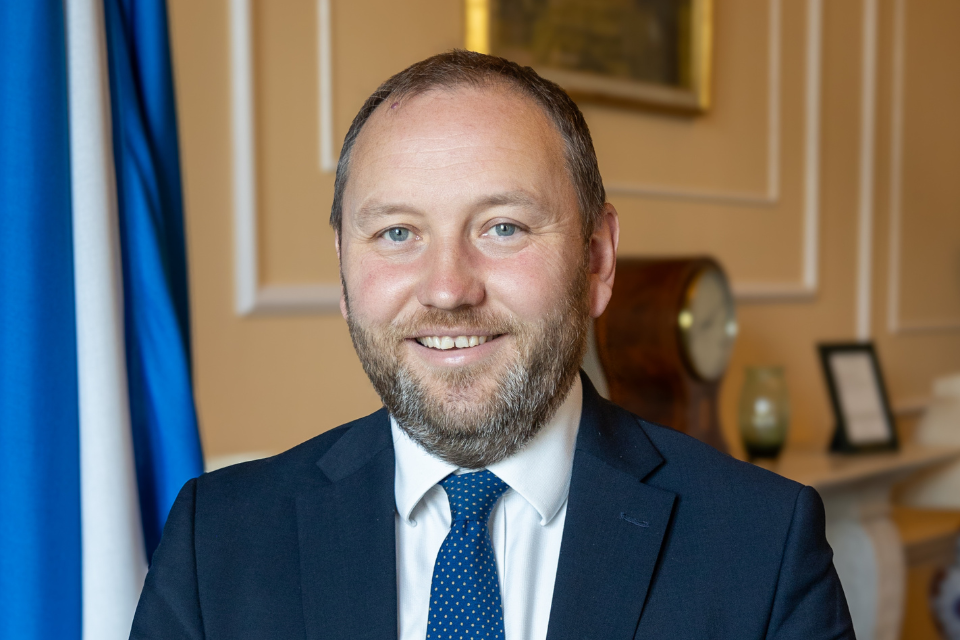Scottish Secretary responds to the King’s Speech

Speaking after the King’s Speech, Scottish Secretary Ian Murray said:
“This is a King’s Speech which will deliver the change our country needs. It will deliver for all four nations of the UK and all four corners of Scotland.
“We have a bold and ambitious legislative programme which will ensure we deliver on our mandate.
“Our plans will deliver growth and jobs for our economy. It will establish GB Energy, a publicly owned energy generation company which will create jobs and cut bills for good, and establish a National Wealth Fund to invest in the industries and jobs of the future.
“The King’s Speech also delivers the biggest transfer of power towards working people in a generation, with new rights on sick pay and redundancy, and better pay. It will ban exploitative zero hour contracts and increase the minimum wage to a real living wage. A better deal for working people, with less insecurity and more money in their pockets, is the first step towards reducing poverty in Scotland and across the UK.
“We have been clear that we want to reset our relationship with the Scottish Government, and to work together to deliver better outcomes for people. Our rail ownership bill will ensure that ScotRail is kept in public hands, and we want to work with the Scottish Government to pass laws that will reduce the availability of addictive vapes to young people.
“We promised change. This King’s speech demonstrates we are rolling up our sleeves and delivering that change.”
Bills which will apply in Scotland:
- Renters Rights Bill [only in respect of discrimination against tenants on benefits or with children]
- National Wealth Fund Bill
- Pensions Schemes Bill
- Planning and Infrastructure Bill [some measures]
- Employment Rights Bill
- Passenger Railway Services (Public Ownership) Bill
- Railways Bill
- Bank Resolution (Recapitalisation) Bill
- Product Safety and Metrology Bill
- Border Security, Asylum and Immigration Bill
- Armed Forces Commissioner Bill
- Digital Information and Smart Data Bill
- Draft Audit Reform and Corporate Governance Bill
- Great British Energy Bill
- Sustainable Aviation Fuel (Revenue support Mechanism) Bill
- Terrorism (Protection of Premises) Bill [Reintroduced]
- Draft Equality (Race and Disability) Bill
- Tobacco and Vapes Bill [Reintroduced]
- House of Lords (Hereditary Peers) Bill
- Cyber Security and Resilience Bill
- Commonwealth Parliamentary Association and International Committee of the Red Cross (Status) Bill
- Lords Spiritual (Women) Act 2015 (Extension) Bill
- Budget Responsibility Bill
- Hillsborough Law [Public Candour] Bill [TBC – territorial extent to be determined]
Related
Llyods Recruiting Engineers In India After Slashing Jobs In UK
Lloyds Banking Group is planning to hire hundreds of engineers in India as the company plans to shift its employment opportunit
Major new funding for music acts that supercharged careers of…
£1.6m Music Export Growth Scheme to support 58 independent UK artists to tour the world Funding will boost UK’s creative industries – a key growth se
Well-loved restaurant chain to close 8 venues across UK as…
A BELOVED restaurant chain has announced it will close eight venues across the UK, scrapping 158 jobs in the process.Owners are pointing the finger at Labour's
US adds 151,000 jobs in February as unemployment rate ticks…
The latest figures published by the US Bureau of Labor Statistics today (7 March) came in below market expectations, with economists polled by












